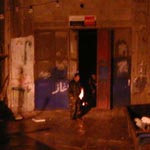
Mark S. Meadows 1090-a palmetto Ave, Pacifica, CA, 94044-2216, USA 650-359-7151, v 650-359-1691,f 415-377-8154,c pighed@bore.com -- bore.com | boar.com Three Days in The Land of Many Gods; v.1 -- 03 January, 2001 v.2 -- 12 January, 2001 Notes: Photo suggestions are made in brackets. Screen-rez photographs can be found at http://boar.com/day/israel/images/ Print resolution is available on request. An outline that corresponds with the chapter numbering is provided at the end.
24 Dec, 16:00 -
My plane landed landed in Tel Aviv's Ben Guiron international airport December 24. The state of the nation has been less than festive; Barak's dropped out of the race, the hawkish Likud Party leader, Ariel Sharon, will probably win the elections, army leaders are resigning, and the Intafada (the "shaking off") seems to be lacking leadership enough to provide families with the simplest of support.
Meanwhile people die.
But there was a once-in-a-lifetime convergence of Christmas, the final days of Ramadan, Hanukkah, and, of apocalyptic course, the end of the 2000th year. So I rented a car in Tel Aviv and drove my merry self to Bethlehem.
Before I left everyone that I spoke to thought I’d either been born again or blown a fuse. Visiting a war zone can do you a lot of harm. style="mso-spacerun: yes"> Getting killed cleanly is one thing, but getting maimed, trapped, buried under a building, dismembered by a landmine, or is sampling the latest in middle-eastern torture methods is not my idea of fun. But learning what's really on the other side, and returning home with these lessons is. style="mso-spacerun: yes">
As you may have heard, Bethlehem is a short day's mule ride south of Jerusalem. Christmas Eve was a rainy mess. The checkpoint was a black and blue smear of flashing lights, militant metal, muddy rains, concrete blockades, and resigned traffic. I'd read news that Bethlehem had been closed for Christmas and that the normal entourage of pilgrims were canceling their reservations faster than you can say "Parum-pa-pum-pum." I'd also read that the hotel I had reservations at had been bombed by the Israeli military less than a month ago.
"No one feels like celebrating." the papers read. Y2k Christmas in Bethlehem had, like a press release or movie, been canceled.
It must have been The Force or Divine Intervention when the barrel of the machine gun was touching my shoulder and the checkpoint guard asked me something I didn't understand (to add to my problems, I speak neither Arabic nor Hebrew). He was asking me, presumably, why I wanted to enter Bethlehem. No one was allowed. Christmas wasn’t happening.
"English?" I replied.
"Ah leettle," he told me.
As El Jefe de la Lingua Franca I had an immediate home field advantage. I threw back "I am working to the hospital fix their computers my family lives here I go for 12 years soon." He paused, squinted at me, and waved me on through.
It worked so damn well I might use this as a pickup line next time I need a date.
I checked into the Hotel Paradise which was sporting their newly repaired 4th and 5th floors. Sure enough, they'd been substantially damaged - sheared off by Israeli missles on November 21. I took a hot shower, ate a dinner of brown curry sauce, gold humus and suspiciously yellow meat. I had four shots of grappa, I had three cigarettes, and I had more than second thoughts, but speaking with other human beings is a good idea in times of rash decision. So is heavy drinking. I learned from some people around the bar that the bombing of the hotel was almost entirely unprovoked. According to my new Palestinian friends, whose accounts I had no reason to believe or doubt, the Israelis were trying to undermine Christmas tourism, hitting the Palestinian territory where it hurt the most - in the pocketbook. The bartender told me that when the hotel shook he ran for the crapper downstairs. He waited underground for five minutes. Another missile shook the hotel, etc. At about this point in the conversation the proverbial saloon doors swung wide and the hotel lobby filled with some 12 Palestinian soldiers. Yassar Arafat himself is staying in Bethlehem, they told us, but no news on which hotel. "Seems obvious enough, I thought to myself.
The swarthiest and most decorated of the soldiers - a general-type; a huge, dark wolf of a man - had a hookah, a tray of drinks, and a full meal of lamb kebabs sent up to his room. The lobby thinned out and the drinking resumed.
We were joined by a couple of the soldiers. One of them, a fellow named, let's say, Yair, spent 4 years in a Jerusalem prison. He showed me the scars on his back, the burn marks on his neck, and the recently double-jointed fingers on his left hand; souveniers of Israeli inquisition. But he seemed more sad than scarred. Lacking transportation, he wasn’t going to be able to get home to see his family. I figured I'd be safer with him than alone, so I offered him a lift home the next day.
I headed to my room, a bit blurry. The rain was a solid roar on the window. I cracked it a bit and looked out, thinking back a couple millennia, wondering what pregnant people in these parts did with themselves on nights like this. Across the street from my hotel in a small garage behind a dumpster I saw a fire burning and figures carrying automatic rifles. Time suddenly seemed shifty, but hoping it was the grappa, I decide to get some sleep. I opted for the side of the bed furthest away from the window.
As if it would do any good...

2 --
25 Dec, 07:00 -
In pre-adolescent Christmas-morning form, I yanked on my raingear and headed down through the lobby (empty washed-out cardboard colors, stench of Clorox), into the street, (new sky, smells of trash, rain, cinnamon, and wet concrete), and through some alleys (landscapes of thrown rubble, steep hills, surprising angles). Outside the light bouncing off the wet city was so glorious it was almost frightening. Everything - the entire world - seemed to have been bleached a mysterious almond color.
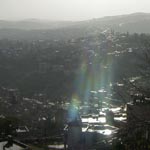
The Church of the Nativity, Christ's' celebrated birthplace, sits on top of the largest hill in an already bumpy horizon (As an aside, I have a hard time seeing why Mary and Joseph climbed such a large hill to have a baby. I have an easier time understanding why a church would be built there. But on second thought, if an angel told ME I were going to give birth to The Son of God and Savior of Mankind, I might seek higher ground, too.) Its composed of several small fortress-like churches that rest on top of a cave. Its just a cluster of white and yellow rocks. And beyond that, you have to take everything else on faith.
The bells banged out 08:00 and several wraithlike nuns flapped across a cobblestone courtyard and got sucked into a four-foot tall door. Inside the citadel all the signs of holiness had been conscientiously coordinated. It was a visual formula; slanted morning light, slow strange singing, ambient incense, triumphal arches, sacred tiles, and everything worn smooth by the gentle polishing of pilgrims' hands. And then spread just above the podium at the center of the nave was a big plastic banner that read "BETHLEHEM 2000" with a nifty little logo designed to let you know that someone's paying attention to you, too. Other than the moaning orthodoxy the place seemed empty. A few tourists waddled in, and since there was only about 6 of us no one had put chairs out. It was awkward. In fact, it was downright embarrassing. All of this marketing fanfare and only a handful of us were faithful or stupid enough to show up for the party.
The tourists that were there were handing each other their cameras, photographing each other, posing while they kissed the grotto (X marks the spot for those whose spiritual dowsing rods lacked fine-tuned sensitivity). The photo was clearly more important than the act of kissing the grotto; the proof of the spirituality was what was important here. This orgy, this glut of posing and bowing in a syncopated dance to the snaps of a photographic drum, made my throat dry. The nuns were shaking their heads, tisking. One looked the color of the meat I'd had for dinner. But maybe it was the lighting.
I thought of Jesus kicking the merchants out of the temple. Then I took a few photos, myself.
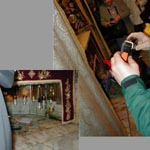
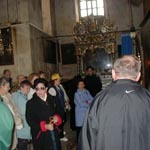
Outside, the Arabic market was a relief and life still seemed in existence there. The rain continued, the sun stayed visible, and the morning again took on its City of David glow. As long as I stayed away from the damned church, the holiness of Christmas didn't seem so empty.
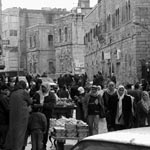
But even in the air of the Arab market, it was clear; this was where life was because this was where activity was. The congregation was assembled in full force outside, talking, trading, laughing, deciding. It was not the church, but here where people spent their days and defined their existence. If they made a difference it was here. If there was a Passion, it was here, in this courtyard of commerce, under the watchful eye of the almighty shekel.
And America, too. Commerce has done a fine job of giving us things to live for. Perhaps, it could be argued, shopping has done a better job of defining who we are and what we believe in than praying. At least, that seems to be the case in the last 100 years.
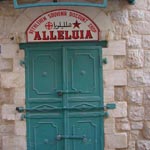
In confusion and horror I walked back to the entry of the church, looking for solace and hoping to be shown the error of my ways.
The huge banner read "BETHLEHEM 2000." And there was the little nativity logo - a 4-story flag of modern marketing. It told people of the importance of the place. Like the X that marked the spot of Jesus' birth, it told people what was important and what to believe. It gave us faith.
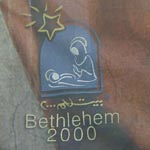
3 --
25 Dec, 10:00 --
When I got back to the hotel lobby Yair was there, suspiciously lumpy bag in hand, dressed in civvies. 10:00 as he'd promised, and so we left, as I'd promised. I cant say that I was comfortable but after hitching the length of the US seven times this seemed an excellent traveling companion; since Yair had been born about 15 minutes south of Bethlehem so he knew all the backroads and banditos. So we avoided all the checkpoints and visited all the local sights. We passed the 5,000-year-old baths that Solomon built, then we passed the 5,000-year-old tombs of his ancestors, then we passed the 5,000-year-old quarries, then we arrived at his home.
Be'it Fajar is a mining town - like any in, say, Michigan or Ontario. But in Be'it Fajar, everything is gold. The butter-white stone is cut by Palestinian masons who then sell the product of their labor to the Israeli condominium builders setting up camp on the adjacent hillside. Yair complained of this repeatedly. He didn't know the English word for condominium, but it was obvious when he pointed to them.
The clouds started to break. He decided to take the opportunity to explain - mostly with gestures - about Ramadan, about his wife, about his baby, about his father and uncle and cousin and friends from his childhood that are either alive or dead, depending... some of whom (the living, I mean) we met 10 minutes later. We visited his elementary school.
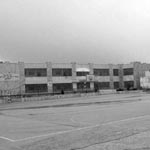
It had a big pile of sand and a hoop for basketball. He was quite proud of it. Every now and then he’d break into a verse or two of small song, softly patting himself on the neck. He’d laugh at small images of beauty. He carried a .38 on his belt and was trained in marksmanship, judo, kung-fu, boxing, and knife-fighting. He liked milk with his tea. At 30 years old, he was some 5'7" with a dark hair, a thick beard and as many scars on his face as I have on my hands. And he had stoney dark eyes that were even brighter than his teeth. For being someone that wanted to rip the world apart, Yair turned out to be a perfectly nice familyman.
I think Yair hated the Israelis and his imprisonment more than he took issue with their laying claim to parts of the West Bank, etc. But it was a hatred fueled by other Palestinians he spoke with - maybe other PLO members. style="mso-spacerun: yes"> "Its my land.. MY land.. and the Israelis bulldoze my land, my houses, shoot my babies... MY babies." Obviously Yair, or at least his sentences, had an identity that reached outside of his skin, outside of his family, outside of his hometown and stretched over the Israeli settlements down into the other Palestinian territories.
"This is MY Land. I don't go to Jerusalem now." Yair said this. Was it intended as a political statement, an oxymoron, or an intentional hypocrisy? I suspect both parts of the sentence were sincere. The land and his freedom were birthrights he felt he deserved.
"This is MY Land." Yair repeated.
I made it clear I understood.
But despite the sincerity of his tone, I couldn't help wondering who he'd heard say this first. I don't think he was merely parroting, but I don't think the hatred had been born in his heart. Nurtured there, certainly. Since Yair had been born just a few years after the 1967 war he hadn't gone more than 50 kilometers from his birthplace save for the time he visited Jerusalem with the attentive accompaniment of Israeli handcuffs. The PLO had become his family, and, therefor, had taught him his family values.
We visited a large hole in the ground that was lined with stones. His parents had lived there when they were children, and had hid from the Israelis there when they were adults. Yair took me into his mosque, he read the posters on the wall. He showed me books, fabrics, posters, murals. It was Muslim to me, but I was reminded of Christmas as I looked at the crescent at the front of the room. As far as I'm concerned its all about which prophesies you happen to buy. Moses and Jesus were pretty good salesmen. So was Mohammed, for that matter.
Yair lives in a typically Arabic complex with the rest of
his family. His brothers and parents
are across the street, other family members are peppered through the
village. His living room is small with
a frame of pillows around the living room carpet. style="mso-spacerun:
yes"> His wife, her head customarily draped, brings out a heater.
I take off my shoes.
She's kind enough to make me lunch (I
suppose it was kindness).
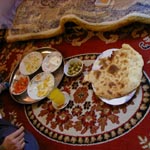 Meanwhile,
its Ramadan, so they cant eat until 5pm.
This makes things a bit touchy for me.
His son likes my camera. Yair instructs his son to give me a kiss on the
cheek. They show me some photos.
I compliment them on the photo of their
son. They insist I take it.
I sincerely resist.
But I’m too late. Its not a question of
whether I want it or not; the rules of hospitality are designed to over-ride
desire and discomfort. I mentioned it
was a nice photo, therefor I had (I suppose) asked them for it.
Next time I wont be so nice.
Meanwhile,
its Ramadan, so they cant eat until 5pm.
This makes things a bit touchy for me.
His son likes my camera. Yair instructs his son to give me a kiss on the
cheek. They show me some photos.
I compliment them on the photo of their
son. They insist I take it.
I sincerely resist.
But I’m too late. Its not a question of
whether I want it or not; the rules of hospitality are designed to over-ride
desire and discomfort. I mentioned it
was a nice photo, therefor I had (I suppose) asked them for it.
Next time I wont be so nice.
The afternoon was filled with holiday spirits and a severe sort of holiday generosity. By the time I wedged my way out the door I'd eaten a full lunch and shared several hours of stories with Yair's family. I said goodbye, he handed me the photo of his son, and so ended my lunch with one of the members of the Palestinian Liberation Organization.
I stood for a while in front of my car. The rain had started again. I looked down the muddy street and up at the sky, filled with murky intestinal clouds.
I felt like a man who had no home at all.
4 --
25 Dec, 16:20 --
I drive south from Be'it Fajar for an hour or so and bump up against the coastline of the Dead Sea. The sun is low. My boots are light yellow with dust. I feel chapped. The desert is far too large. The birds have switchblade wings and obsidian eyes. To my right the sea is flat, blue, rimmed with white salt. To my left sharp sandstone hills climb up from the highway's edge. I'm 400m below sea level and the atmospheric pressure is obvious.
Ahead a factory, like a nightmare city, glitters against the sky. "Dead Sea Works." It might have been a pun. Its a huge processing plant, crouched on the water's edge, squatting, at least a mile wide, sucking up the mud of this ancient, tapped body of water, burping its plumes of noxious gas into the deserted, evening skies. This factory practices an old trade: collect minerals and sell them. This started some 6,000 years ago with the Egyptians as the first clients (albumen’s good for mummification, I hear) and so the factory is, I'm sure the modern equivalent of what's been on this spot for a few millenia.
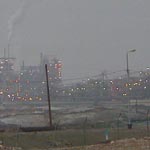
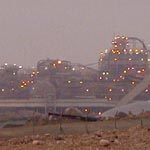
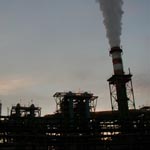
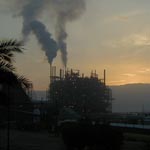
I take a few pictures for the hell of it.
A few minutes later I passed a sign that read "Mt Sodom, Hiking Trail." I wasn't sure if I was in a modern hell or an ancient one, but whichever, it was a relief from the political and religious tangles up north.
Good thing the sign was there.
It looked like any other mountain to me...
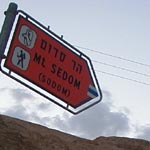
5 --
27 Dec, 07:10 -
The "Old City" or "Temple Mount" or "Noble Sanctuary" (or whatever you happen to call it) is a collision of a hundred worlds; catacombs more complex than New York's subway systems, surprising courtyards of butterscotch stone, clustered gateways leading into cloistered cloisters, cats, people, trash, prayers, stones worn smooth from centuries of feet shuffling over them, whispered secrets, booksellers, convenience stores, padlocks, puddles, and very small cars worming their way through this huge stone city like termites in a well-worked block of wood. The Old City is riddled with paths that have been practiced for thousands of years.
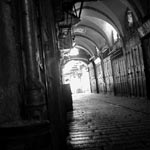
The Wailing Wall and the Church of the Holy Sepulchre seemed, somehow, the same - rituals being followed not because it was the most direct path, but rather because it was the most worn. Orthodoxy, like a crocodile or shark, deserves respect. It's proven its value because it continues. But I wonder if this, alone, is reason enough to follow it or reason enough to change it. Fortunately, these holy sites continue without my opinions.
Out along the boulevards, huge banners printed in contemporary four-color hung from the streetlights trumpeting "JERUSALEM 2000." The only difference between this marketing campaign and the one I had seen in Bethlehem was that Jerusalem's wasn't focused to one or two locations.
The Holy Land is full of messages and the subtle sales of extreme ideas. Some of them are brand-new, some are as old as the villages. But the wars, the religions, and the patriotisms are siblings of a single parent; determination to defend the ideas of others. What else would the twins of Commerce and Religion?
Pilgrims and Bargain-Hunters both need clear directions.
27 Dec, 12:15 –
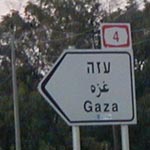
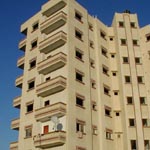
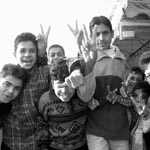
I'm a big fan of contrast so a couple hours later I arrived at the border to the Gaza strip. I don't recall much of what happened; there were three sets of guards, three sets of gates, a hundred or so Palestinians sitting, waiting, a gate pass, a 1/4 mile walk to the Palestinian line, hot sun on black asphalt, a moment to notice a line of cabs, the cab drivers fighting, and fighting over my shekel, a fist is made, someone swings, I push this aside, I get in a cab, gray smashed buildings chatter by the cab window. The driver is saying things I don't understand.
Concrete and rebar was everywhere.
It was the fact that we drove by a block of what looked like bombed-out buildings that slapped me out of my dream. The buildings seemed like dry mouths that had just had all their teeth pulled. They were bleeding dust and golden Arabian light, and the weeping in the distance was the simple blue sky of the clear ocean.
I got out somewhere, paid some extra shekels, and started walking. It didn't matter where I was since truth, contrary to the opinions of the marketing I'd seen over the last few days, exists everywhere always. Naturally, I didn't want to get shot. I wanted to collect impressions and meet people. Bullets are small, people are large, bullets do not last long, people do. I was hopeful, somehow.
Gaza remains for me the image of the children that live there. They're playing among the rubbish with toy guns and trash toys. And next to them, livestock pick through piles of offal, buildings lay heaving, rebar reaches for the sky, carhorns scream, dust rises, ghostlike. Theirs is a freedom that is so far out of their grasp that most of the people under 30 have never left the city.
First, I saw that Gaza was critically damaged. The streets looked like canyons of concrete walls - unfinished or bombed-out was unclear and didn't matter since no one was living there. Then I saw that Gaza was crawling with children. For being a city of more than one million, 80% of these appeared to be kids. It was a weekday, it was December 27, it was during that day. It seemed these kids should be inside getting various body parts wiped by parents, or sleeping, or eating, or at school, or working or something besides following me around yanking on my shirt, saying things like "Hello American!" and "Whats your Name?" and "Take The Picture Now!" Regardless of this perpetual recess, it was the war zone I had imagined it would be, replete with spray-painted propaganda, clusters of barbwire, distant gunshots, palm trees, and tanks. But at the same time there were all these crazy children swarming around me.
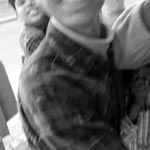
Second, I saw that Gaza City seemed a place where the people were selling merchandise, honking horns and making a living. Commerce fluttered and money flowed. Gaza’s like Tijuana or Juarez. It has a distinct pulse at the markets and intersections. Like any city with Time's Squares and Broadways, the action lives where the grids of the city intersect. This makes the city modern.
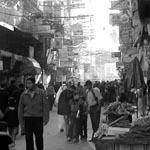
Then, third, after I had walked through the mazes of empty buildings for some 4 or 5 hours, Gaza seemed not just full of children, but even a sad child itself. The city looked punished, weak, separated, cut apart, and sad. Gaza City seemed a gray, skinless muscle; separated from its body, diced by militant wires, and drained dry. But still twitching with an innocent, hateful, ignorant hope. It was reaching for something.
The kids ran around me, asking for photos, asking my name, wanting someone to talk English with them. They churned around me, pulled on me. They'd chase each other through the street, kicking a ball or whipping a donkey that was pulling a cart made with cannibalized jeep tires. They had dolls and they had firecrackers. Dolls normally make me nervous, but being in a war zone, so did firecrackers.
Then there were the bullets, which made me downright jumpy.
At some point in the afternoon, maybe 3:30, 5 boys in a cart
pulled by a donkey rolled by.
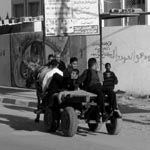 That-which-was-not-firecracker snapped
twice, so I ducked into a doorway, and looked up across the street for someone
who could site me. Several men ran
around the corner. Another shot was
fired. I saw no hooded Intafada, no
armored Israelis, no tanks or ranks of soldiers; just the children in the cart
urging their donkey to get out of the way.
That-which-was-not-firecracker snapped
twice, so I ducked into a doorway, and looked up across the street for someone
who could site me. Several men ran
around the corner. Another shot was
fired. I saw no hooded Intafada, no
armored Israelis, no tanks or ranks of soldiers; just the children in the cart
urging their donkey to get out of the way.
The dust hung motionless in the air and the donkey pulled the cart. The boys' heads rotated. The, 'Trot-trot-trot' sounded silly and the moment contradicted itself. Everyone had run around the corner.
"Trot-trot-trot" faded away.
The moment was absurd.
And it was hot. An hour later my feet were sticking to my shoes, my back felt brittle, and the adrenaline had long ago worn off. The idiocy of the violence made me sick and the miles of walking aggravated my condition. The air smelled like vomit. Three young men with soft eyes were standing under an olive tree, one of them held his lover's chin while he softly cooed in his face. A block later they cruised me in a shitty grey sedan, hanging out the window, the language barrier no speedbump for nasty proposals made even nastier when spoken in Arabic. Which I didn’t understand. But clearly they needed a fourth for their afternoon diversions.
The day grew strange with the shadows and I decided to leave.
My cab driver, about 28 years old, had a missing ear and a leftwise lean to his head, and he drove with his wrist, his hand confidently dangling over the front of the wheel. He was intelligent. His name was Mohammed. He reminded me of a friend back home. He'd never left Gaza and I wondered what I seemed to him, dropping in for my afternoon stroll, asking him about his life and job, about who he took around town, what he thought of Israel, what he thought of Gaza, what he though of America. I mentioned to him that Ezra gate – the northern entrance to Gaza - was a bit spooky and I asked him how he dealt with it. In response he made a fist and popped himself in the sternum. He looked at me, pressed his palms together, and answered, "Be strong with God." He seemed to glow for a second before slowing the cab in front of an Israeli tank. The Israeli borderguards were clean, confident children of the first world. They were made of green Kevlar and gray metal, warriors comfortable with long-ranges and short spats.
I got out of the cab and walked north.
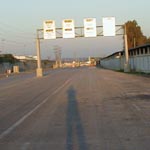
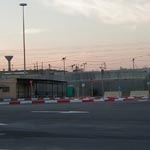
As I walked through concrete checkpoints, I was damn glad for my piece of paper, my blue gate pass in hand, that said I'd been born somewhere else. I turned around and looked back into the smoldering sky, ripening with the setting sun. I thought of this man's statement, "Be strong with God" And I thought of the Russian tourists in the Church of the Nativity where the message was "BETHLEHEM 2000." And I thought of the other place where the banners read "JERUSALEM 2000."
Three messages in three different places for three different religions that somehow, long ago, managed to start a river of blood.
Maybe some excavation is needed. Maybe once we got deep enough below these three messages we’d find that their foundations share the same ground. Maybe we’d find they aren’t so different, nor so far apart, as we once thought.
/end---------
The next afternoon I left for the Finnish Arctic Circle.
But that’s another story.